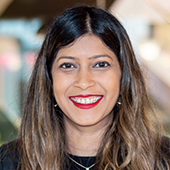
Don’t fit in, stand out
27 July 2022

By Roxanne D’Souza, Partner in our London office and a key author of Baringa’s first gender pay gap report.
Growing up in Bangalore, my early years were something of a contradiction. With a European name and a Catholic religion, my family were a little unconventional among my peers. I felt a bit different! Yet my family held traditional values and views about my future. My parents’ idea about what was best for me as a girl was to have a family and not necessarily to focus on a career.
Embracing change and taking control
That wasn’t the future I wanted. I wanted adventure and opportunity. So, having never been to England and having never travelled out of India on my own, I chose to go to Lancaster to do an MBA - a place where sheep outnumber people. To say it was a culture shock is an understatement, not least because I experienced debate and student input for the first time, rather than being talked at by academics. I suppose it was here that I started to see that life didn’t have to be shaped by the hierarchical structure I was used to. It was OK not to fit in and be like everyone else; the world is curious about who we are.
After completing my MBA, I worked in consulting and industry roles, predominantly in telecoms, culminating in me joining Baringa in 2015. Working with clients and diverse teams, I love getting stuck in to project delivery, being in the thick of it and solving problems. I’ve used that same passion for getting things done in my work on Diversity & Inclusion projects, not least the gender pay gap reporting process that I helped initiate.
Know your worth
It is so important to me that everyone is rewarded fairly for their skills and expertise. Yet when I first worked in the UK, I had no idea what I was worth. I was often told I was at the bottom of the scale, when in fact my colleagues earning more than me was not always down to their talent, but because they were better at negotiating. Starting out in my career I felt disadvantaged, feeling like I had to fight for everything but not having the confidence to do so as a junior employee. I remember coming into a boardroom to present at a meeting that was experiencing technical issues, only to be greeted with relief that the IT person had arrived just because I was Indian. Fortunately, these big stereotypical blunders happen less in today’s world, but it’s safe to say that there are still real issues with inclusion in many organisations.
Ticking boxes doesn’t work
Sadly, and very much unlike Baringa, lots of organisations recruit or fill project teams according to metrics, with token numbers of women and people of colour. It’s great that organisations are becoming more diverse, but I really feel that more work needs to be done on the inclusion part of D&I, getting rid of all the little things that add up to bigger issues – appraising women on their outfits or hairstyles, or making lazy assumptions based on racial stereotypes. What feels jarring is that I see organisations recruiting people with diverse backgrounds and ethnicities, but then expecting everyone to be the same once in the corporate bubble. What’s great about Baringa is that we encourage people to be their authentic selves, we celebrate the fact that we all have different approaches and perspectives. For me, that is true diversity and I try hard to encourage and support others to be truly comfortable with who they are and how they work.
Don’t fit in, stand out
It’s taken me a while, but I have found my own identity and realised that it’s OK not to fit in. As a woman in a senior role, I feel a real responsibility to show others that it’s possible and desirable to have ambition. I am blazing my own trail. Proud of my Indian ethnicity and newly a British citizen married to an Englishman. Comfortable that I won’t have children (which is a particularly big deal to Indian women) while welcoming stepchildren into my life. Determined to help others find their true selves. Taking responsibility for playing my part. Celebrating who I am.
Is digital and AI delivering what your business needs?
Digital and AI can solve your toughest challenges and elevate your business performance. But success isn’t always straightforward. Where can you unlock opportunity? And what does it take to set the foundation for lasting success?